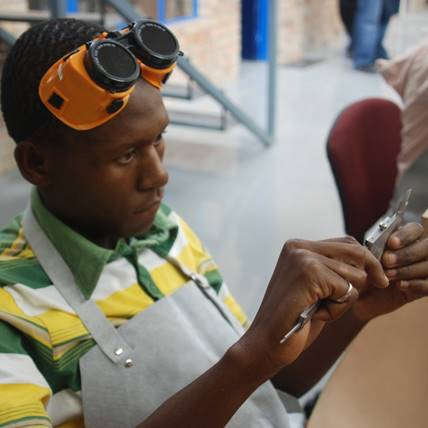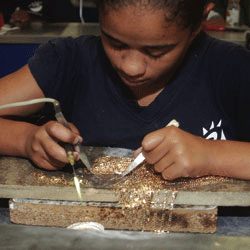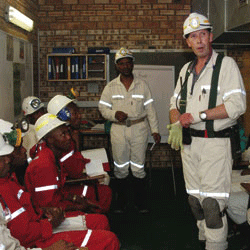
A jewellery student at SEDA Platinum Incubator, which aims to facilitate the beneficiation of platinum
Image Gallery (3 Images)
The right way to promote ethics
 2.8 k views | By Stuart Braun
2.8 k views | By Stuart Braun
Ethical jewellery issues extend further than blood diamonds and dirty gold. As consumer awareness grows, how can jewellers promote ethical standards? Stuart Braun investigates.
In late 2009, an episode of the US version of 60 Minutes reported that gold revenues were helping to fund violent conflict in the Congo, and criticised the international jewellery industry for not having a universal system to track the source of gold used in jewellery manufacturing. In an effort to protect an industry worth almost $60 billion a year, jewellers moved quickly to limit the fall-out – Tiffany and Co. reassured consumers that its gold was sourced exclusively from a single mine in Utah, for example. Meanwhile, jewellers across the world signed the "No Dirty Gold" pledge, which promised a responsible sourcing of precious metals, including stringent environmental standards. Today, around one-quarter of all US retail jewellers have made this pledge, but ethical jewellery remains a latent, still slumbering issue in Australia.
"We have never been asked about dirty gold," explains Cameron Marks, managing director of Sydney jeweller Percy Marks and current chairman of the Diamond Guild of Australia. Whether this is the fault of the media, or symptomatic of Australian insularity from what is otherwise a hot global issue, dirty gold is only one of a range of ethical jewellery issues reaching across the entire supply chain from mining to retail.
Since the first reports of African conflict diamonds rocked the gemstone market in the late 1990s, the global jewellery industry has moved to codify ethical standards so as to try to avoid the smear of ethically-suspect business practices. Industry heavyweights like Tiffany and Co. and BHP Billiton have been instrumental in establishing watchdogs like the Responsible Jewellery Council (RJC), which was founded five years ago to police ethical standards across all levels of mining, manufacture and retail. Despite its proliferating global membership, the RJC is still in its development phase.
"Tiffany and Co. was among the founders of the RJC, and has been an incredibly active member because of the recognition that the industry needs to impart ethical standards across the board," notes Michael Rae, the Melbourne-based CEO of the RJC who previously worked on mining certification for the World Wildlife Fund.
"To defend and enhance the brand that is gold and diamond jewellery, it has to be an effort by the entire industry," Rae continues. "It is no good having a couple of niche producers who can do the right thing when the public’s reaction to the vast bulk of the industry may not be as everyone would want."
The industry has been able to claim that the Kimberley Process, a certification scheme employed to trace diamonds that have helped fund wars in Africa, has reduced the number of conflict diamonds in the global jewellery production cycle from four to one per cent since it was established in 2003; however, the Kimberley Process has faced sustained criticism amid claims that conflict diamonds are easily smuggled and still used for money laundering and organised crime. Add to this the emergence of fraudulent Kimberley Process certificates onto the market.

A worker at the OroAfrica gold jewellery factory in Cape Town, South Africa
On top of this, a raft of other ethical issues relating to human rights and environmental consciousness have risen in prominence, each with the potential to taint the industry permanently – the big two are child labour and carbon pollution. Yet while ethical consumerism is on the rise in Australia as the impact of climate change looms large, an oft-conservative local jewellery market has been slow to acknowledge and promote an increased demand for ethical jewellery.
"The issue is to make sure that the industry can demonstrate, and ideally exceed, customers expectation regarding the quality of the goods in every sense," Rae explains of the rationale behind the RJC. "It is to make sure that this beautiful thing is made from gold and diamonds that are sourced and manufactured in a way that ensures the product is worthy of the symbolism that the customer invests."
The RJC aims to codify "responsible practice at every part of the supply chain," continues Rae. Issues concerning mining, labour conditions, and occupational health and safety need to be monitored at every stage of trading, cutting, polishing, and manufacture.
The RJC is in the process of committing to an independent, third-party audit-certification process, which Rae says will be in place by late 2010. Amid some concerns that the RJC is wholly dominated by, and adjudicated by, self-interested members of the jewellery industry itself, Rae believes the certification system will be largely unprecedented: "This is where the industry should be proud of itself."
Even luxury brands like Gucci are joining the RJC before third-party certification is finalised, illustrating a growing global commitment to ethical standards. "Our participation in RJC is a further step into an even more responsible path," said a representative of Gucci in a press release before joining the RJC in 2009.
The World Jewellery Confederation (CIBJO) is another vocal advocate for ethical, sustainable jewellery. It promotes a variety of beneficiation projects across South Africa, including OroAfrica, where lower-income workers are taught valuable jewellery-making skills. Because platinum is mined heavily in South Africa, a raft of community empowerment initiatives have recently been established, including the SEDA Platinum Incubator (SPI), which promotes small business access to platinum group metals.
There are other ways in which jewellers assure consumers that their product complies with human rights and environmental standards. Manning posits a few ethical essentials, asking, "As a jeweller, do you know each mine your gems come from? And do these mines cause harm to the environment and the local people? Do you have evidence that child labour is not being used? Where do your metals come from? These are just a few of the questions that must be asked if we are to take our industry into the future."
As Rae suggests, ethical standards actually go to the heart of jewellery’s timeless appeal, and could give jewellers the point of difference they’ve been looking for. "Selling high-end jewellery is about helping a customer to fall in love with an object," Manning says. "Building a story, making it more than just another object, enhances its value and sales potential. Once you have sorted out your supply chain, you and your customers know that the sale has led to increased social wellbeing and a healthier environment for everybody."

Trainee miners in a classroom on South Africa
Melinda Nugent, gemmologist, jewellery designer, and founder of Ethical Jewellery Australia, is another of the few Australian jewellers trading exclusively in ethical product. Nugent established her business in response to the dearth of environmentally and socially-aware product on the market. Furthermore, as a gemmologist, Melinda began to realise the very high environmental, and human, costs of mining gemstones.
"It is possible to insist that there is no child labour used, that all workers experience fair working conditions and that communities should directly benefit from the sale of their natural resources," she says, adding that interest in ethical issues is increasing. "Talking about the issues with people who were previously unaware often meets a positive response, but there will always be consumers for whom price is the bottom line."
Nugent exclusively uses recycled gold, and urges jewellers to be aware.
“Becoming a responsible jewellery retailer takes a lot of research and work," she says. "You have to be prepared to find out everything you can about who is supplying you with your materials."
Perhaps the gravest indicator that the industry is in over its head was the decision made by key diamontaire and industry commentator Martin Rapaport to resign from the World Diamond Council in January due to concerns with the Kimberly Process. Rapaport labelled the process a "sham" after the ongoing mining of conflict diamonds in Zimbabwe was exposed. As cited by US ethical jewellery advocates Fair Trade and Ethically Sourced Jewelry, Human Rights Watch reported in late 2009 that Zimbabwe’s armed forces were "engaging in the forced labour of children and adults", and "torturing and beating local villagers on the diamond fields of Marange district in Zimbabwe".
Even though 99 per cent of the industry has no dealings in conflict diamonds, such an issue could have devastating repercussions for an industry that already struggles to earn consumer trust if it is targeted by the mainstream media. A reluctance for jewellers to utilise standards like RJC certification, as well as to employ their own internal supply-chain monitoring, currently places Australia behind the rest of the world in the global PR war over ethical gold and diamonds. One can only wonder if such complacency is courting danger, given the speed with which these issues are able to dismantle consumer confidence when they arise.
For now, however, the industry will just have to continue holding its breath.
Posted August 24, 2010